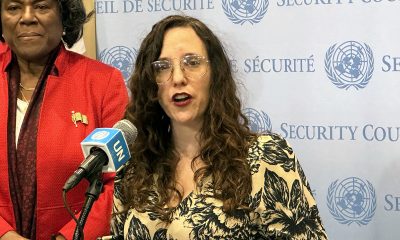World
Out in the World: LGBTQ news from Europe, Asia, and Canada
Slovenia court rules same-sex couples have constitutional right to assisted reproduction

SLOVENIA
The Constitutional Court has issued a ruling that laws barring same-sex couples and single women from accessing assisted reproduction are unconstitutional discrimination.
The court has left the laws in place while giving parliament one year to bring the laws governing assisted reproduction into compliance with the constitution.
The Slovenian LGBTQ advocacy group LEGEBITRA celebrated the ruling in a post on its web site.
“The decision of the Constitutional Court is a victory for all those who wanted to start a family in Slovenia and were unfairly deprived of this opportunity in the past. Rainbow (and single-parent) families are part of our society, and their children are part of the community in the country in which they live and grow up. It is only fitting that their story begins here,” the post says.
The Treatment of Infertility and in Vitro Fertilization Procedures Act has had its restrictions on single women and same-sex couples from fertility treatment targeted by progressive legislators since it was introduced in 2000.
Amendments that would have allowed single women to access in vitro fertilization were passed in 2001 but were immediately put to a citizen-initiated referendum, which voted them down.
Since then, the former Yugoslav republic has undergone a number of progressive changes, including joining the European Union in 2004 and gradually expanding LGBTQ rights.
In 2020, a group of legislators from the Left party asked the Constitutional Court to review the law, and the following year, their request was joined by the state’s Advocate for the Principal of Equality.
The court spent more than four years deliberating the appeal, during which time it also struck down laws banning same-sex marriage in 2022. Parliament later amended the law so that same-sex couples enjoy all rights of marriage, including adoption, but left the ban on assisted reproduction in place.
The Slovenia Times reports that the ruling was welcomed by the governing coalition, which includes the Left party. The government has pledged to move quickly to implement the ruling.
“This corrects one of the gravest injustices done to women by right-wing politics and the Catholic Church in Slovenia, who denied women the right to become mothers,” the Left said.
The case was brought by a group of left-leaning MPs four years ago — but perhaps the delay is related to the fact that in that time, the court also struck down the ban on same-sex marriage in 2022.
RUSSIA
Russian authorities raided three nightclubs in Moscow over the weekend as part of the state’s deepening crackdown on LGBTQ people and expression, Radio Free Europe reports.
The raids took place late Saturday night and early Sunday morning at the Mono, Arma, and Simach nightclubs in the capital. All three clubs have been known to host themed events for LGBTQ clientele.
According to Russian state-owned media outlet TASS and several Telegram channels, patrons, and employees of the clubs were forced to lie on the floor with their hands behind their heads before they were carted away in police wagons. Patrons and workers had their phones, laptops, and cameras seized and documents inspected
It’s not yet known what prompted the raids, although Russian authorities frequently claim to be inspecting for illegal substances and drug users.
Russian authorities have carried out several raids on LGBTQ establishments since the passage of a law banning positive portrayals or information about queer people in 2022. Last year, the Russian Supreme Court ruled that the “international LGBT movement” is an “extremist organization” and granted a request from the Ministry of Justice to ban it from the country.
Russia’s crackdown on LGBTQ rights has inspired copycat legislation among its neighbors, notably in Georgia, Belarus, and Kyrgyzstan.
CANADA
A small town in Northern Ontario has been fined C$10,700 (approximately $10,000) for its refusal to issue a Pride Month declaration or raise the rainbow flag.
The town of Emo population 1,300, which sits on the border with Minnesota about 200 miles northwest of Duluth, had been requested to issue the Pride declaration by Borderlands Pride in 2020 and raise the flag for one week, but the town council refused in a 3-2 vote, prompting a years-long legal battle.
Last week, that came to an end as the Ontario Human Rights Tribunal found the town and its mayor guilty of discrimination and ordered the town to pay Borderlands Pride C$10,000 in compensation, and the mayor to pay an additional C$5,000 ($3,559.92).
“We didn’t pursue this because of the money. We pursued this because we were treated in a discriminatory fashion by a municipal government, and municipalities have obligations under the Ontario Human Rights Code not to discriminate in the provision of a service,” Doug Judson, a lawyer and board member of Borderlands Pride, told CBC News.
The tribunal also ordered the mayor to take a Human Rights 101 training course offered by the Ontario Human Rights Commission within 30 days.
Mayor Harold McQuaker has not commented publicly on the ruling.
CHINA
Calls for Hong Kong government’s to officially recognize same-sex unions have intensified after the city’s Court of Final Appeal issued rulings last week that affirmed lower court rulings that found same-sex couples have equal rights to inheritance and social housing as heterosexual couples.
The ruling was in line with a similar ruling issued last year by the city’s top court, in which the city was ordered to provide legal recognition for same-sex couples by September 2025.
The new ruling with facilitate same-sex couples’ access to public housing, a vital need in one of the world’s most housing-crunched cities. The ruling also affirms that same-sex spouses can inherit public housing from a deceased spouse.
In both cases, the ruling only applies to spouses who have legally married overseas, because Hong Kong does not yet have a way for same-sex couples to legally register their relationships.
The nearest places where same-sex Hong Kong citizens can marry are Australia and the U.S. territory of Guam, with Thailand becoming available in the new year. Although same-sex marriage is legal in nearby Taiwan, residency requirements may block access there.
Although legislators have been slow to act on demands for civil unions or same-sex marriage, Hong Kongese same-sex couples have gradually gained access to more rights through court actions.
The Court of Final Appeal has previously ordered the government to have foreign marriages recognized for immigration purposes, to allow same-sex couples to file their taxes jointly, and to stepchild adoption.
Australia
Lesbian tennis player from Russia defects to Australia
Daria Kasatkina has publicly criticized war in Ukraine

A Russian tennis player who came out as a lesbian and publicly criticized her home country’s war against Ukraine has defected to Australia.
“My application for permanent residency has been accepted by the Australian government,” said Daria Kasatkina in an Instagram post on March 28. “Australia is a place I love, is incredibly welcoming and a place where I feel totally at home. I love being in Melbourne and look forward to making my home there. As part of this, I am proud to announce that I will be representing my new homeland, Australia, in my professional tennis career from this point on onwards.”
The Telegraph reported Kasatkina in 2023 said she left Russia because she did not feel safe “as a gay person who opposes the war.” Kasatkina’s partner is Natalia Zabiiako, a Russian Olympic figure skater who was born in Estonia.
“Obviously, there are parts of this decision that have not been easy,” said Kasatkina in her Instagram post. “I want to express my thanks and gratitude to my family, coaches, and everyone who has supported me throughout my tennis journey to date.”
“I will always have respect and fond appreciation for my roots, but I am thrilled to start this new chapter in my career and my life under the Australian flag,” she added.
Argentina
LGBTQ seniors in Argentina face uncertain future
President Javier Milei’s policies have disproportionately impacted retired pensioners

Editor’s note: International News Editor Michael K. Lavers will be on assignment in Argentina and Uruguay through April 12.
Argentina has undergone significant changes in its economic and social policies since President Javier Milei’s inauguration in December 2023. These changes have had a significant impact on various sectors of society, especially retirees and the LGBTQ community.
Mercedes Caracciolo, a 79-year-old sociologist and lesbian activist, shared her experience with the Washington Blade on how the new measures have affected her quality of life.
“Since Milei’s arrival in government, which began with a brutal devaluation, I am more careful in my spending than I was before,” she said.
Although Caracciolo has additional income from rental properties, she recognizes the situation is much more critical for those who exclusively depend on a pension.
With more than 7 million people receiving pensions, many find themselves “scratching the poverty line” due to the loss of purchasing power. The libertarian government’s economic policies have drastically affected their welfare, leading to a wave of protests across the country.
The reduction of social programs and the lack of LGBTQ-specific public policies have deepened the difficulties that seniors already face. The loss of economic stability particularly affects those who have historically lived on the margins, with fewer job opportunities and limited access to a decent retirement. Many older LGBTQ people, who have spent their lives unable to form traditional families, now find themselves without a support network and with an increasingly less present State.
The advance of conservative discourses has also generated a climate of insecurity and fear.
“There is no more sense of security and stability in old age,” Graciela Balestra, a psychologist who is the president of Puerta Abierta a la Diversidad, the first home for LGBTQ seniors in Argentina, explained. “Many LGBTQ+ retirees fear that there are fewer and fewer rights. They see what is happening in Argentina and globally with the advance of the right wing, and they feel that what they worked so hard to achieve is in jeopardy.”
In addition to economic difficulties, the LGBTQ community has faced additional challenges.
Caracciolo noted many supportive spaces have had their government subsidies reduced or eliminated, weakening community networks essential to the well-being of LGBTQ seniors.
“Community networks are also weakened because many of them require state support for certain types of expenses,” she noted.
Balestra warned about the psychological impact.
“Obviously it impacted mental health. There is much more anxiety, there is fear. People who say ‘I’m afraid they’ll kill me’ or ‘I’m afraid to show myself,'” she said. “Before, they used to walk down the street holding hands with their partner, and now they don’t do it anymore. A lot of hopelessness.”
For Balestra, the concern goes beyond the LGBTQ community.
“The economic issue, the rights issue, the fear that something similar to the dictatorship will return. All of this is very scary. And besides, the hopelessness of believing that this is going to continue, that it is not going to change even in the next elections,” she said.
Civil society organizations have denounced an “adjustment” in policies related to gender and diversity that Milei’s government has undertaken. Pride marches in Argentina have become a stage for protests against the president’s policies, especially over his speeches that activists consider hateful towards the LGBTQ community.
Balestra stresses the fear is not only individual, but collective.
“Human rights no longer exist anywhere, women no longer have the place they used to have, they are once again objectified, machismo is on the rise again,” she said. “This brings a lot of despair to older people.”
Despite the climate of uncertainty, Balestra emphasizes resistence forces are still in force.
“We continue working, as always,” she said. “For 25 years at Puerta Abierta we have been doing reflection groups, cultural workshops, social meetings, all with respect to being able to make LGBT people aware of their rights. We never stop meeting, but lately we are talking more and more about these things that we had already left a little behind. The issue of coming out, fear, visibility. Now we have to talk about it again.”
Africa
Report: Anti-LGBTQ discrimination has cost East African countries billions
Open for Business highlights Kenya, Uganda, Tanzania, and Rwanda

The economies of four East African countries are losing more than $5 billion a year because of discrimination against LGBTQ people.
The 80-page report that Open for Business, a coalition of leading global organizations that champion LGBTQ inclusion, released in late March focuses on Kenya, Uganda, Tanzania, and Rwanda. It attributes the losses to anti-homosexuality laws, and predicts more economic costs if lawmakers implement other harsh anti-LGBTQ measures.
The report notes Uganda is losing $2.4 billion, or 5.2 percent of its GDP, annually because of the Anti-Homosexuality Act that took effect in 2023. Open for Business last October revealed the country had already lost $1.6 billion in foreign direct investment, donor aid, trade, tourism, public health and productivity after President Yoweri Museveni signed the law.
Kenya is losing $1.5 billion, or 1.38 percent of its GDP.
The report warns that enacting the pending Family Protection Bill would cost the country an additional $6.3 billion, or 5.8 percent of its GDP, annually. Opposition MP Peter Kaluma, who has introduced the measure, in January claimed the Biden-Harris administration had blocked it and vowed to have fellow MPs pass it after U.S. President Donald Trump’s inauguration.
Kaluma is a strong supporter of Trump and the Republican Party’s opposition to LGBTQ rights and other far-right conservative ideologies.
Tanzania is losing $1.1 billion, or 1.33 percent of its GDP, because of anti-LGBTQ discrimination. Rwanda is losing $45 million, or .32 percent of its GDP.
Homosexuality is not illegal in Rwanda unlike the other three countries, but consensual same-sex sexual relationships remain taboo. Queer Rwandans also face stigma, discrimination, social exclusion, and arbitrary detention.
“A series of private member bills in Uganda, Kenya, and Tanzania have threatened to pull the region back in terms of progress and human rights for LGBTQ+ people, and damage both the ease of doing business and their international reputation,” states the Open for Business CEO Dominic Arnall.
Arnall notes his organization’s extensive engagement with businesses across East Africa over the last five years has always linked harmful anti-LGBTQ laws to impacts on a country’s investment prospects.
“The finding lays bare an uncomfortable truth: That laws that harm the LGBTQ+ community are standing in the way of prosperity and growth for all citizens in the region,” he said.
The report calls for LGBTQ inclusion as part of the region’s broader economic development agenda.
The Open for Business report notes anti-gay violence and discrimination in Tanzania has been on the rise since the late-President John Magufuli came to power in 2015. The country’s punitive anti-homosexuality law with a 30-year prison sentence for consensual same-sex sexual relations was already in place, but queer Tanzanians were generally not systematically targeted.
“Reporting of neighbors or community members for suspected homosexuality is frequent and law enforcement officers have been known to pose as members of the LGBTQ+ community to entrap and blackmail LGBTQ+ individuals,” states the report.
It also notes the Tanzanian government’s crackdown on websites and social media accounts that promote LGBTQ rights and threatening the arrests of administrators who allow such content. The report concludes this suppression has caused queer people to live in fear and isolation.
Religious organizations, particularly Christian churches in Tanzania, also champion anti-LGBTQ rhetoric by encouraging their followers against tolerating homosexuality and transgender people. Politicians, meanwhile, use anti-LGBTQ narratives to gain support during campaigns.
While Rwanda stands out as the only East African country in which homosexuality is not criminalized and has foreign donors implementing programs that target the queer community, discussing LGBTQ rights in public is rare and same-sex relationships are not legally recognized. The Open for Business report notes this situation creates legal ambiguity and a fragile social environment for queer Rwandans.
“Several LGBTQ+ rights organizations have emerged in recent years, mostly in Kigali, although they do not always identify themselves as LGBTQ+ associations and are rarely formally registered, making it difficult for them to receive funding,” reads the report.
The Rwandan government has rejected calls to criminalize homosexuality, which it considers a “private matter.” It has also been adamant against efforts to protect queer people for fear of domestic opposition and a desire not to politicize the issue like in neighboring countries.
Kenya, like Rwanda, has for a long time been considered more receptive of queer people, “as long as LGBTQ members are not ‘too loud.’”
Anyone convicted under Kenya’s colonial-era sodomy law could face up to 14 years in prison. Efforts to enact a harsh anti-homosexuality law and anti-LGBTQ protests that religious leaders, politicians, and activists have organized have increased homophobia in the country.
“LGBTQ individuals report significant difficulties in securing formal employment, which pushes many of them into more precarious livelihoods in the informal sector,” states the report.
-

 Movies3 days ago
Movies3 days agoSexy small town secrets surface in twisty French ‘Misericordia’
-

 The White House1 day ago
The White House1 day agoUSCIS announces it now only recognizes ‘two biological sexes’
-

 Federal Government4 days ago
Federal Government4 days agoMass HHS layoffs include HIV/AIDS prevention, policy teams
-

 Maryland5 days ago
Maryland5 days agoAt transgender visibility celebration, Moore called out for lack of action










